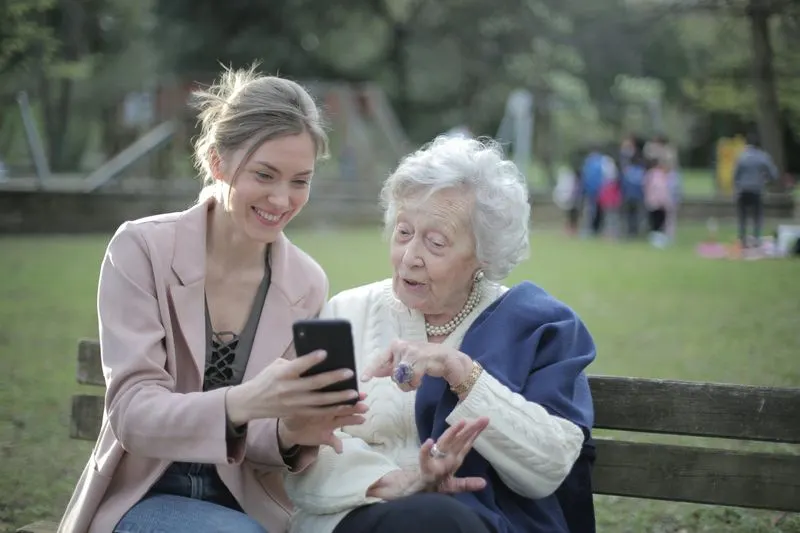Every generation has its habits, but some things Boomers do really seem to rub younger people the wrong way.
Whether it’s clinging to outdated ideas, oversharing on Facebook, or dropping the classic “back in my day” line, these behaviors can leave Millennials and Gen Z rolling their eyes.
Here are 12 habits that younger people just can’t seem to get past. While some are lighthearted quirks and others are genuine gripes, they highlight the generational gap in a way that’s sure to spark a few laughs—and maybe even a little self-reflection.
Overusing the Phone

Public spaces often transform into personal phone booths for some, much to the chagrin of those around them. Conversations that could easily be private are sometimes broadcasted for everyone to hear.
This habit not only disrupts the ambient tranquility but also invades the auditory space of others. Younger generations prefer a quieter, more respectful approach to communication, especially in shared environments.
They often resort to texting or social media for conversations, valuing privacy and discretion. This cultural clash over phone etiquette can lead to misunderstandings and frustrations on both sides.
Resisting Technology

Navigating the latest gadgets poses a significant challenge for some Boomers. Their resistance to technological advancements often results in a reluctance to embrace new tools.
Younger people, who are digital natives, find this hesitance puzzling and occasionally frustrating. This resistance sometimes extends to ignoring or dismissing the conveniences technology offers, leading to inefficiencies.
The divide isn’t merely about age but about adaptability and openness to change. Encouraging mutual learning and patience can bridge this gap, fostering better understanding between generations.
Nostalgic Stories

Frequent trips down memory lane can be charming, but overindulgence can wear on younger listeners. Stories from “the good old days” sometimes come across as dismissive of contemporary experiences.
Younger generations appreciate historical context but prefer engagement with current topics and forward-thinking discussions. Balancing nostalgia with present-day relevance creates a more inclusive dialogue.
Storytelling is an art that should evolve, respecting both past and present perspectives. This balance fosters intergenerational respect and understanding, allowing for constructive conversations that value all viewpoints.
Paper Over Digital

The preference for paper over digital solutions is a hallmark of older generations. While there’s a certain tactile satisfaction in holding physical documents, the inefficiencies are clear.
Younger people, accustomed to digital convenience, find this habit outdated and cumbersome. The environmental impact of excessive paper use also contributes to its unpopularity.
Encouraging digital literacy and showcasing the benefits of going paperless can help shift this perspective. Bridging this gap requires understanding and patience, promoting sustainability and efficiency in daily practices.
Formality in Dress

Choosing formality over comfort in attire can create a visual and cultural disconnect at casual gatherings. Boomers often favor traditional dress codes, reflecting values of etiquette and respect.
Younger generations, however, appreciate a more relaxed approach, prioritizing comfort and self-expression. This difference can lead to awkwardness or perceived rigidity.
Encouraging an understanding of different cultural norms around attire can help bridge this visual gap. Mutual respect for personal style choices enhances social harmony, allowing for diverse expressions of identity.
Misusing Social Media

Navigating the social media landscape can be tricky for those not raised with it. Boomers often misinterpret or misuse platforms, leading to faux pas that younger users instantly recognize.
This generational gap in digital etiquette can cause embarrassment or misunderstandings. Younger people value digital literacy and appreciate when others take the time to learn.
Offering patience and guidance can enhance mutual understanding and improve online interactions. Social media should be a space for connection, not division, and embracing new skills can bridge these gaps.
Talking Down to Younger People

Condescension often sneaks into conversations, whether intentional or not. This tone can alienate younger individuals who value equality and respect in dialogue.
Being talked down to creates barriers and fosters resentment rather than understanding. Younger generations prefer collaborative discussions where ideas are shared and respected equally.
Encouraging open communication and valuing diverse perspectives can mend these conversational rifts. Building bridges through respect and empathy ensures that all voices are heard and appreciated, fostering better intergenerational relationships.
Complaining About Change

Change is a constant that some find hard to embrace. Boomers might express frustration about evolving social norms, technology, or cultural shifts.
This resistance to change can seem negative or obstructive to younger people, who often welcome innovation and progress. Understanding the roots of these complaints can offer insight into differing worldviews.
Encouraging open-mindedness and dialogue about the benefits of change can ease tensions. Embracing adaptability and acknowledging positive aspects of change can create a more harmonious environment.
Overemphasis on Hard Work

Hard work is a value deeply ingrained in older generations, often seen as the sole path to success. However, younger people recognize that efficiency and work-life balance are also critical.
This overemphasis can lead to misconceptions about laziness or lack of ambition. Recognizing diverse approaches to achieving goals can enrich the conversation.
Appreciating the balance between dedication and personal time fosters healthier work environments. Sharing stories of success through various methods highlights the evolving nature of work and achievement.
Avoiding Sensitive Topics

When discussions veer into sensitive territory, some may quickly change the subject. This avoidance can prevent meaningful conversations about important issues.
Younger people value openness and honesty, even when topics are uncomfortable. Engaging in these discussions with empathy and understanding is vital for growth.
Encouraging open dialogue about challenging topics can lead to greater empathy and understanding. Creating safe spaces for these conversations fosters intergenerational learning and collaboration.
Addressing uncomfortable issues head-on builds trust and strengthens relationships.
Expecting Traditional Manners

Adherence to traditional manners is a common expectation among older generations. However, the casual nature of modern interactions often contrasts sharply with these expectations.
Younger people prioritize authenticity over formality, leading to potential friction. Understanding that etiquette evolves with culture and time is crucial.
Encouraging flexibility in social norms allows for more genuine interactions. Respecting different manners and finding common ground can enhance social experiences, bridging generational divides.
Understanding and respecting these differences fosters mutual respect and connection.
Long-Winded Voicemails

Lengthy voicemails have become a relic of past communication methods. Younger people favor succinct messages or texts that convey the necessary information quickly.
This habit can lead to frustration as it disrupts the fast-paced nature of modern communication. Teaching concise communication can alleviate this annoyance.
Understanding and adapting to preferred communication styles enhances clarity and efficiency. Encouraging the use of contemporary methods streamlines interactions and reduces misunderstandings.
This adjustment fosters smoother communication, respecting both time and technological advancements.

